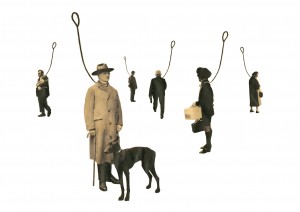The Galloway reading makes interesting discussion of Gillies Deleuze‘s idea about “Societies of Control”.
Source: http://eagainst.com
These societies are one’s that operate not with the industrial machines of old, but with new machines, information technology, with computers! As the picture above might suggest, we are being controlled and our leashes tugged at, but by who? and how?
Galloway provides this example by Critical Art Ensemble (CAE) of how we have shifted from a disciplinary to society to one of control…
“Before computerized information management, the heart of institutional command and control was easy to locate. In fact, the conspicuous appearance of the halls of power was used by regimes to maintain their hegemony. . . . Even though the monuments of power still stand, visibly present in stable locations, the agency that main- tains power is neither visible nor stable. Power no longer permanently resides in these monuments, and command and control now move about as desired.”
This idea seems to lend itself very much to technological determinism, suggesting that our actions are influenced and controlled by technology, specifically computers. We take direction from our screens and mediums that take directions from other technologies. In all of this, Galloway seems to be asking, where and from whom are our directions being given?
In answer she offers us, “The Internet”, the most extensive “computerised information management” system.
Galloway then provides a brief history about the development of the internet, messaging systems and basic computer language or code.
The piece is enlightening but succinct and illustrates all points simplistically and in a somewhat step by step fashion that makes it easy to follow.
Speaking about protocol, she explains that it “protocol is a technique for achieving voluntary regulation within a contingent environment.” and in relation to commuters and societies, it governs how “how specific technologies are agreed to, adopted, implemented, and ultimately used by people around the world.” Computer protocol is about “logic and physics” as opposed to governing systems like diplomacy that used sense, consideration and discussion to create protocols.
Our society responds to and acts according to computer protocols more often that to protocols that we dictate to each other as a society, perhaps simply because its easier to email an audience that speak to them, to Facebook group them than gather them in person. We need the computer for the most basic communications… even telephone calls which still retain a degree of “face-to-face” contact is old fashioned and troublesome.
Paints a somewhat bleary future for confident and eloquent speakers. I’m left thinking about those who have the git of the gab behind and a screen and a keyboard but lose all their wit when standing before another human being.



